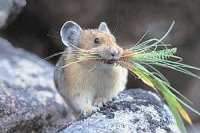 The tiny rabbit-like American pika, an animal species considered to be one of the best canaries in a coal mine for detecting global warming in the western United States, appears to be veering toward the brink of extinction in the Great Basin.
The tiny rabbit-like American pika, an animal species considered to be one of the best canaries in a coal mine for detecting global warming in the western United States, appears to be veering toward the brink of extinction in the Great Basin.New research indicates the small mammals, which are very sensitive to high temperatures, are being pushed upward in their mountain habitat and are running out of places to live. Climate change and human activities appear to be primary factors imperiling the pika, reports University of Washington archaeologist Donald Grayson in the current issue of the Journal of Biogeography.
"Human influences have combined with factors such as climate change operating over longer time scales to produce the diminished distribution of pikas in the Great Basin today. This makes controlling our current impacts on them all that more important," said Grayson.The animals are isolated in patches across mountainous areas in western North America, from the southern Sierra Nevada and Rocky mountains to central British Columbia in Canada. In the Great Basin, these mountains are separated by large valleys with desert-like conditions that pikas can't tolerate. Pikas live in rock-strewn talus slopes that provide them with air-conditioning from hot temperatures and protection from predators.
"We might be staring pika extinction in the Great Basin, maybe in Yosemite, too, right in the face. Today, the Great Basin pika is totally isolated on separated mountain ranges and there is no way one of these populations can get to another," said Grayson. "They don't have much up-slope habitat left."
"Pikas are an iconic animal to people who like high elevations. They are part of the experience. What's happening to them is telling us something about the dramatic changes in climate happening in the Great Basin. Climate change will have a dramatic effect including important economic impacts, such as diminished water resources, on people."
University of Washington